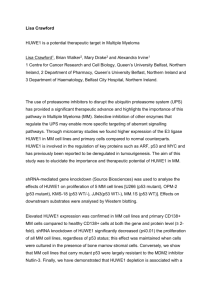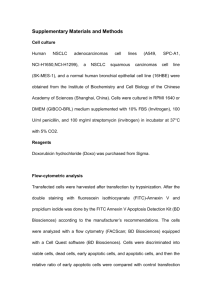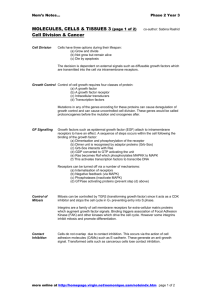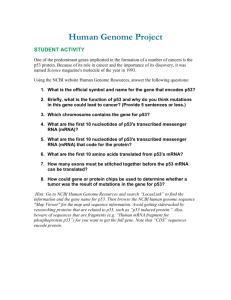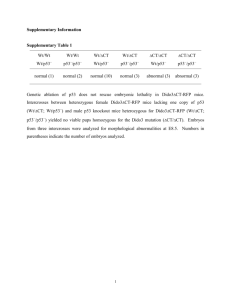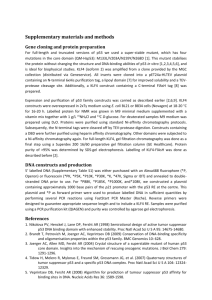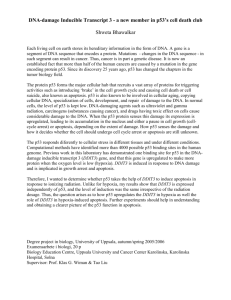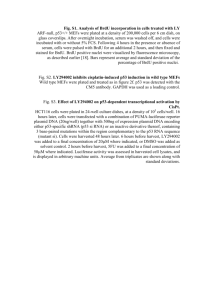p53 controls cancer cell invasion by inducing the
advertisement
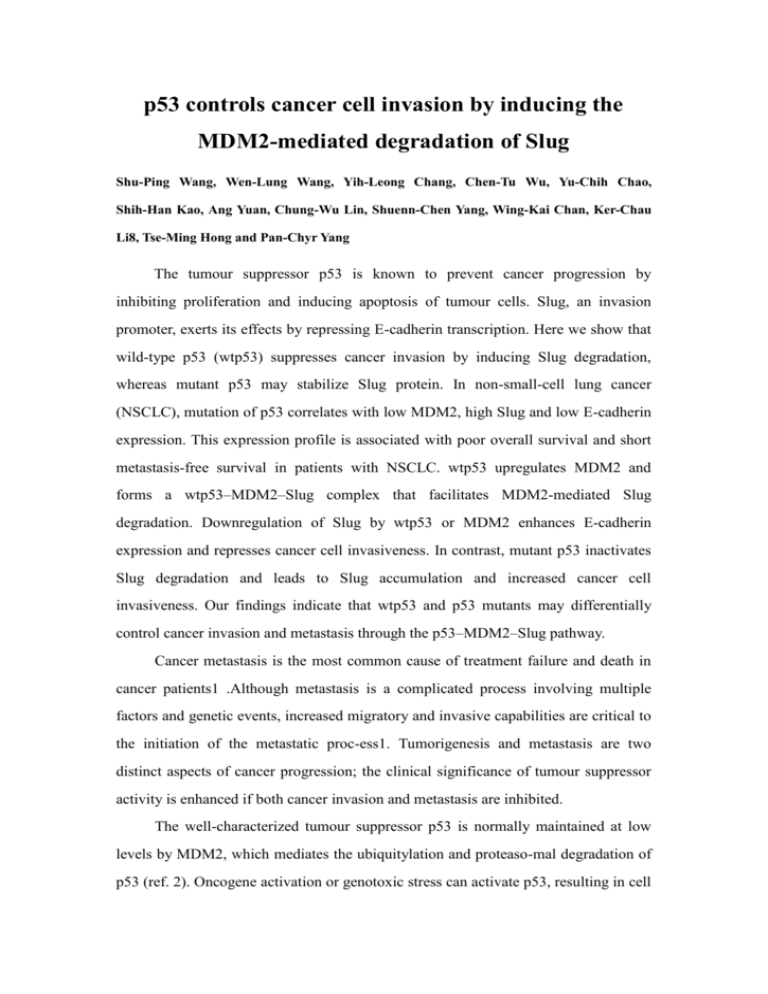
p53 controls cancer cell invasion by inducing the MDM2-mediated degradation of Slug Shu-Ping Wang, Wen-Lung Wang, Yih-Leong Chang, Chen-Tu Wu, Yu-Chih Chao, Shih-Han Kao, Ang Yuan, Chung-Wu Lin, Shuenn-Chen Yang, Wing-Kai Chan, Ker-Chau Li8, Tse-Ming Hong and Pan-Chyr Yang The tumour suppressor p53 is known to prevent cancer progression by inhibiting proliferation and inducing apoptosis of tumour cells. Slug, an invasion promoter, exerts its effects by repressing E-cadherin transcription. Here we show that wild-type p53 (wtp53) suppresses cancer invasion by inducing Slug degradation, whereas mutant p53 may stabilize Slug protein. In non-small-cell lung cancer (NSCLC), mutation of p53 correlates with low MDM2, high Slug and low E-cadherin expression. This expression profile is associated with poor overall survival and short metastasis-free survival in patients with NSCLC. wtp53 upregulates MDM2 and forms a wtp53–MDM2–Slug complex that facilitates MDM2-mediated Slug degradation. Downregulation of Slug by wtp53 or MDM2 enhances E-cadherin expression and represses cancer cell invasiveness. In contrast, mutant p53 inactivates Slug degradation and leads to Slug accumulation and increased cancer cell invasiveness. Our findings indicate that wtp53 and p53 mutants may differentially control cancer invasion and metastasis through the p53–MDM2–Slug pathway. Cancer metastasis is the most common cause of treatment failure and death in cancer patients1 .Although metastasis is a complicated process involving multiple factors and genetic events, increased migratory and invasive capabilities are critical to the initiation of the metastatic proc-ess1. Tumorigenesis and metastasis are two distinct aspects of cancer progression; the clinical significance of tumour suppressor activity is enhanced if both cancer invasion and metastasis are inhibited. The well-characterized tumour suppressor p53 is normally maintained at low levels by MDM2, which mediates the ubiquitylation and proteaso-mal degradation of p53 (ref. 2). Oncogene activation or genotoxic stress can activate p53, resulting in cell cycle arrest, apoptosis, DNA repair and cell differentiation. Mutations in p53 occur frequently in cancers and are present in about 50% of non-small-cell lung cancers (NSCLCs)4–6.p53 mutations in NSCLC are associated with increased neoangiogenesis, higher proliferative index and decreased overall survival6. In addition, p53 mutations are associated with decreased E-cadherin expression7 and increased cancer invasiveness8. Recently, two groups have gener-ated p53-mutant mouse models and found that the tumours developing in these mice metastasize9,10, indicating that mutant p53 may mediate a gain-of-function metastatic phenotype. Moreover, several reports have indicated that p53 is involved in cancer progression by specifically regu-lating cancer invasion. Downregulation of E-cadherin is a hallmark of epithelial–mesenchy-mal transition (EMT), a process that allows epithelial cells to separate from their neighbours and migrate to distant regions during develop-ment or metastasis. E-cadherin is a suppressor of invasion and metas-tasis. Its downregulation is associated with the development of malignant epithelial cancers. Forced expression of E-cadherin suppresses cancer metastasis, whereas functional knockout of E-cadherin confers a meta-static phenotype on benign tumour cells. The predominant mechanism responsible for E-cadherin silencing in most carcinomas is transcriptional repression. Slug (also known as SNAI2), a member of the Snail family of transcriptional repressors, is capable of repressing E-cadherin expression and triggering EMT22–24, suggesting that it may act as an invasion promoter. Recently, we have found that by downregulating E-cadherin (ref. 25). Consistent with the and view Slug promotes NSCLC upregulating that Slug matrix can cell invasion metalloproteinase-2 promote invasion, aberrant upregulation of Slug is correlated with reduced E-cadherin expression and is associated with malignant transformation and metastatic progres-sion in numerous cancers. Here we report an additional mechanism by which p53 regulates cancer invasion. We show that wild-type p53 is able to suppress cancer cell inva-sion by inducing MDM2-mediated Slug degradation. Furthermore, we demonstrate that mutant p53 represses MDM2 expression, thereby stabi-lizing Slug protein in cancer cells and promoting cancer cell invasiveness. RESuLTS Mutation of p53 correlates with outcomes of patients with NSCLC Mutations of p53 occur frequently in lung cancer5,6. Mutant p53 has recently been regulate breast and oesophageal cancer progression by shown to specifically promoting cancer cell invasion. To assess the role of mutant p53 in lung cancer progression, we collected a cohort of 79 patients with NSCLC and determined the p53 mutation status in lung tumour specimens by direct DNA sequencing, as well as p53 protein expression with immuno-histochemistry (Table 1; Supplementary Information, Fig. S1a). The clinical characteristics of the patients with NSCLC are shown in Supplementary Information, Table S1. Among the 79 patients with NSCLC, 33 samples (41.8%) harboured mutant p53, which correlated with high p53 protein expression (P = 0.018; Table 1) and poor overall survival of patients with NSCLC (P = 0.039; Fig. 1a). Mutation of p53 is associated with high expression of Slug and low expression of E-cadherin in NSCLC tumour specimens To determine whether p53 mutation can influence the expression of cancer invasion related genes, we investigated the immunohistochemistry of Slug and E-cadherin in serial sections of NSCLC tumour specimens (Fig. 1b). Most tumours with mutant p53 were associated with high expres-sion of Slug and low expression of E-cadherin. In contrast, tumours with wild-type p53 were associated with low expression of Slug and high expres-sion of E-cadherin (P < 0.001 and P < 0.001, respectively; Table 1). Wild-type p53 inhibits Slug protein expression We then investigated the mechanisms by which p53 regulates Slug expression and modulates cancer cell invasion. In p53-deficient H1299 cells, overexpression of wtp53 induced a substantial and dose-dependent decrease in Slug protein levels without a change in Slug messenger RNA levels (Supplementary Information, Fig. S1b, c). There was no obvious apoptosis in the transfected cells, suggesting that the effect of wtp53 over-expression on Slug was not due to p53-induced cytotoxicity. From :Nature Cell Biology(2009-06) 0703 班 2007114010323 左小龙
